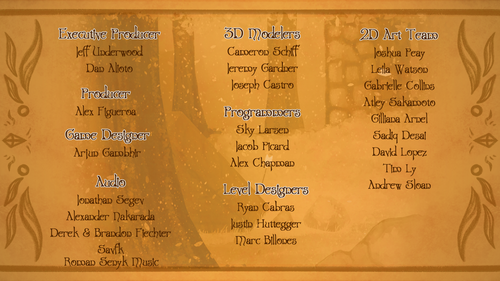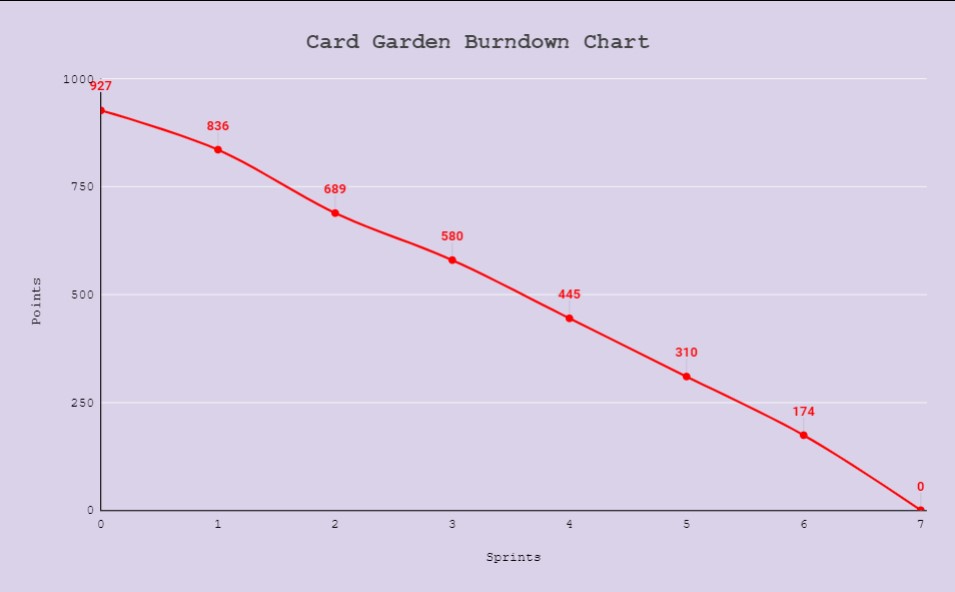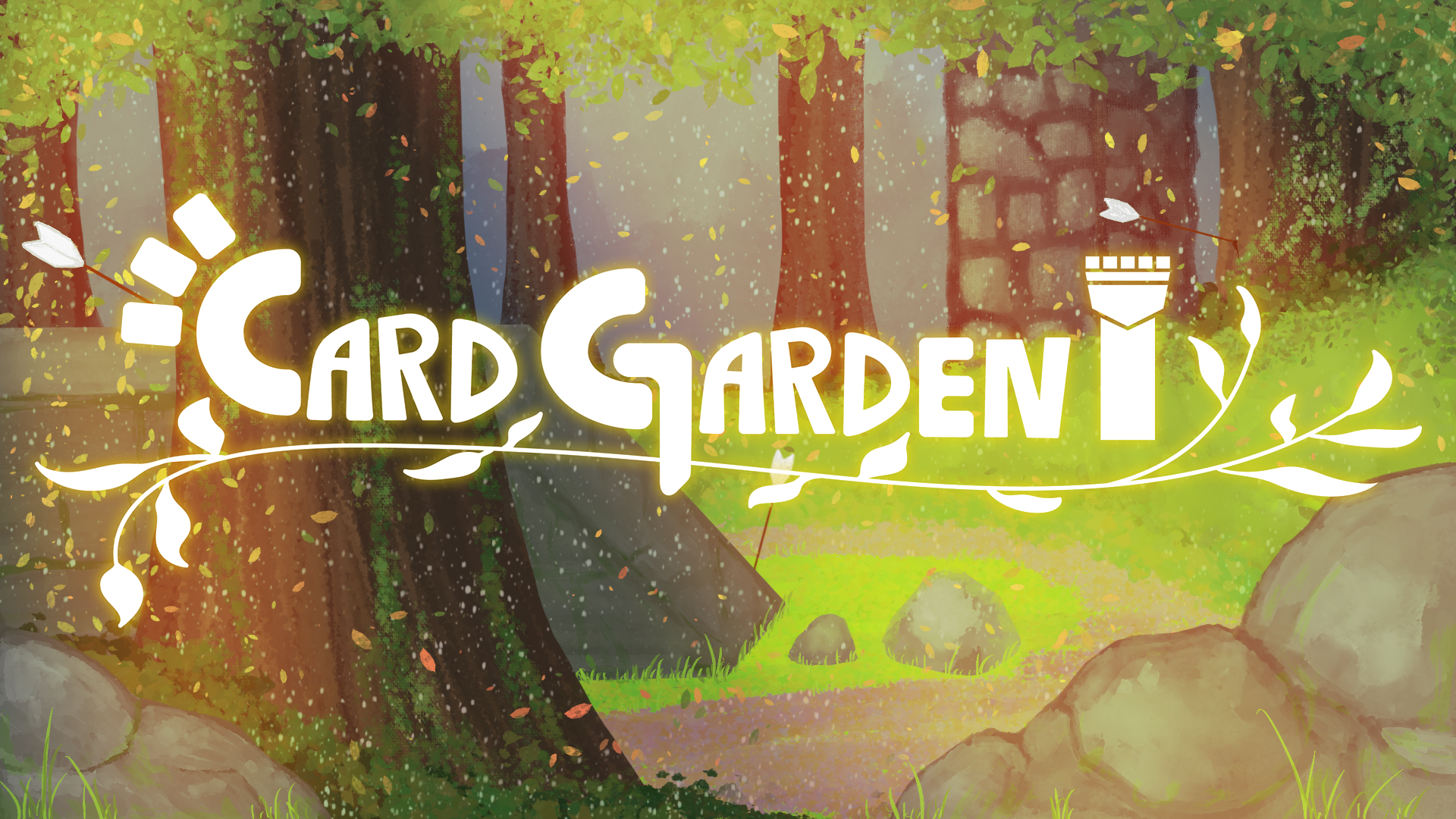Production Postmortem - Card Garden

Howdy everyone! Welcome back to Card Garden for the final post I will be writing; our postmortem. A quick recap for anyone just joining us at the end of our journey: My name is Alexandra Figueroa and I have had the honor of being the producer for a team of 11 student developers as we made Card Garden, a tower-defense card game wherein the player takes on the role of a nature Druid protecting their Lairs around the world from greedy Adventurers whose only goal is to steal and ravage the treasures of your Lairs. You must use a combination of spells, buildings, and minions all conjured by cards to defend your Lair and maintain the balance of nature. It's been nothing short of a pleasure to work on this game and bring it to life; we're all extremely proud of the game we made, so let's go right ahead and jump into all the gritty details!

Over the course of the entire semester, we completed 927 points and 432 user stories. In terms of scope, we actually had to grow our scope from the beginning; we started out with approx. 350 points, which grew to approx. 400, and eventually grew into the current 927 after reprioritizing the features we truly wanted that would make the game fun. There were, of course, some things that were cut for the sake of priority over other features that needed more resources, but they weren't make-or-break for the game. Our team's average point completion per sprint was approx. ~132 points. We had a slow-down only in the third sprint, around the time of many deadlines for various outside classes. I'm extremely proud of my team for not only completing so much work in four months, but also for putting in so much work that we managed to complete all of our epics as well! This game wouldn't be what it is without their dedication to the game, so the biggest props go to all of them for such a huge accomplishment.
There was so much going into this project that was unknown from the start, especially when it came to knowing each other on the team. We did our best to foster a good environment for everyone, but still weren't sure, what with the fully online format, if we'd succeeded. We’d sent out a survey to our team to kinda gauge how they felt throughout the semester, and from that data we were able to determine/confirm the things that went right and the things that went wrong in our overall production.
What went right during production?
Communication
Starting off with what went right, we thought our communication was pretty good! We all faced the challenge of being fully online this semester, but despite that we did our best to adapt to the format and made sure to be as on top of our communication with the team as we possibly could. When assigning tasks, I tried my best to always provide any and all information and references for tasks that were needed or requested; if anything was unclear Arjun and I made sure to clarify and give any additional resources any team member needed as fast as possible. We also made sure to make ourselves as available to our team as possible for anything they might need. One of the things I tried to put extra emphasis on was frequently and consistently checking-in with everyone to see how they were doing with tasks and if they needed any help or had any updates for us. Being on separate sides of a screen made it a little difficult to really know everyone's individual progress at first, but we quickly fell into routine of screen-sharing and sending pictures for updates on tasks during class periods. In turn, I think this all fostered an environment where the team was very responsive to feedback and felt comfortable enough to come to us for anything they needed. People came to us with concerns, ideas, updates, etc. with ease, and it's something that I feel (and, based on their feedback, they felt as well) created an open environment for everyone to be and feel heard.
Team Members/Team Dynamic
The team, despite not knowing each other very well at the start, worked really well together. They quickly fell into the groove of the pipeline early on in the semester, which helped things go quite smoothly over all when it came to progress and efficiency. We also had good fortune in our team members having secret talents, and the willingness to step out of their comfort zones. Specifically, we had special talents for animation and VFX, courtesy of Marc and Ryan, that aided the game really well. Our team dynamic, in terms of the breakdown of specialties and roles, worked really well to hone in our skills and work efficiently together. We carried out the plan of having each of our team members focus on specific aspects of the game itself. Modelers were broken down into Tile Modeler, Character Modeler, and Building Modeler; Level Designers were broken down into L1, L2, L3, with animation, audio, and VFX as secondaries; and Programmers were broken down into Card System, AI System, and Grid System. Breaking it up this way made for a pretty efficient process of doing things that worked out really well in the end. Everyone had their designated thing and did it quite well. We were fortunate enough to have a team composed of incredibly talented individuals that created a product that far exceeded our expectations.
No/Minimal Crunch
From the very beginning, I was adamant that I wanted to make this semester as crunch-free as possible. I was determined to plan it out and do what it took to make sure that our team’s health and well-being were prioritized and that nobody was more stressed out than they needed to be. I did my best with the planning, and made sure to check-in with my team and adapt where necessary and where possible to make sure that we were productive and efficient enough to minimize crunch at the end of production. I’m happy to say that I believe we achieved this, publishing the game by the deadline after finishing it by our own set deadline. Everyone was pretty on-board with the plan and was just as determined to make it happen as well. We’re pretty happy to know that nobody felt unbearably overwhelmed in any way, and that it created a good experience for them working on this game.
Now, onto what went wrong in production!
What went wrong during production?
Complexity
Card Garden, at its start, was an intangible idea that later was brought to life thanks to the efforts of this team. At its core, it is a tower-defense card game; but the intricacies of what that entails were much more complex than they came out to be in the end. The complexity of certain systems had to be simplified for the same of time and pipeline smoothness. Systems like elemental damage types, multiclassing, and others were far too complex to expend the resources to make, and introduced another problem as well. The problem introduced was that these complex game mechanics were not as clear nor as intuitive to players as would be ideal; not only would we be investing resources into making them, but we would also be investing even more resources into introducing and teaching them to the player. In the grand scheme of things, these were lower priority than everything else we were working on, and thus had to be cut.
Too Large Scope
As I've mentioned, Card Garden started as a much bigger idea than it turned out to be. There were many features we just didn't have the time or resources to make, and thus had to be cut. Some of these features include:
- Deck builder
- Micro puzzle levels
- Card customization
- Build synergies
- Card filtering
- Signpost cards & adventure mode
- Card recursion mechanics
- Enemy supertypes & subtypes
- Class abilities
- Unique card properties
- Eclipse & solstice meters
- Custom game modes
For the sake of having a complete game that wasn't an amalgamation of "as many features as we can possibly fit," I had to put a pin in all of these features. Our final product, however, was not hindered by these cuts. We were still able to get three fantastic levels, fifteen unique cards, three different card types, three different enemy types, several types of buildings, level-ups for almost all units, and VFX and audio feedback. When talking to our game designer to reflect on the decisions that led to this outcome, we both had to agree that choosing to focus on what led to our end product was the right choice, and is the reason the game is what it is. Had we focused on trying to do more, I don't think we would have achieved as much as we did to the quality that we did.
Setting Clear Expectations
When Card Garden was pitched, it was more of an idea than an actual design. There was, by game designer admission, a lack of pre-production that we both had to do in the first weekend before the start of official production. This meant a bit of a fragility in the direction of where we were going at the start. In addition to this, we were also figuring out our own standards and practices. This refers to the standards set for modelers (i.e. poly-count budget, art style, comfort zones/strengths, exporting for Unity process) and for Programmers (i.e. GitHub, modularity, roles, etc.). I also had to overcome a bit of hesitancy with confidently leading my team and having expectations for them. This was my first time leading a team this big, and I wasn’t sure at first how to approach leading and directing the team. I wasn’t sure where the line was, or where the middle ground was, and therefore was hesitant in the beginning to confidently lead and delegate tasks. I had to learn my team’s patterns as well, so it was a bit of trial and error at first, but I definitely found my groove after that initial stage. Thanks to this experience, I am a much better producer than I was before.
What would you do differently?
One of the biggest things I would have liked to do differently is to foster the good vibes we had on the team. Everyone worked well together; there were no problems interpersonally at all during production, which was really awesome! The environment we had was great and productive, but would’ve liked to bond more since we weren’t in person and couldn’t do so together. We would also update our info documents more frequently; there were times where we would discuss certain changes to make, and would prepare to tell the team in class the next day, but would forget to update info documents, so they’d still be a step behind when we went to discuss. Additionally, we also would have liked to do a little more UX and pre-production; in regards to pre-pro, it would've allowed for exploration of other art styles, particularly with the 3D assets. Our modelers are incredibly talented people, and in retrospect, pushing those limits a bit to see what they could come up with would've been really cool. In regards to UX, we feel we could've done a lot more if we'd originally had more planned in the beginning, rather than spending time towards the end to add in what we had time for.
What would you do the same?
To put it simply, the things that worked for us the best were: no/minimal crunch planning, discipline specialization, making our designer tools (grid tool, Encounter set-up, card creation), and the modularity of our components. These were all huge contributing factors to the success of our semester, our team, and our game. These were things that we took a bit of a gamble on in the beginning, experimental at the start, but we're so glad that taking those risks (and making those educated guesses/decisions) really paid off in the end. I can't thank the team enough for being as great as they were.
What did you learn?
There are so many things that I learned personally this semester; if I were to word-vomit it all out as it exists in my head, it would stretch this postmortem for miles. This was such a cool experience that taught us so much, but let me try to narrow it down. We learned first, that no/minimal crunch for a project like this is possible. The health and well-being of our team was one of my top priorities, and I'm so so glad to know that A) I was able to prioritize them and spare them an overwhelmingly stressful week for this game, and B) that prioritizing them didn't cost the integrity of the game. We learned second, that while yes, playing to people's strengths is great for progression and efficiency, it's equally as important to give people the opportunity to step out of their comfort zones and grow, and that it can lead to pleasant surprises. We also learned thirdly, that communication is the key to success. Cliché as it sounds, it's true. Communication was crucial to production and keeping our workflow smooth. There’s always room to improve, of course, but I think we did really well with it this semester. Lastly, we learned that we can do it; plenty of us suffer from impostor syndrome, but this semester really proved that despite all the odds against us, we all have what it takes to persevere and come out on top it with something we should all be extremely proud of.
Final Thoughts
As someone who struggled with the notion that I have what it takes to be a producer in this class, I am forever grateful for this experience that came so out of nowhere to me. Originally, I had chosen to bank on the safer choice of applying as an artist, truly thinking that I didn't have what it took to be chosen if I actively went for the position. I can't imagine what this semester would've been like had I not been chosen to be a producer anyway, and I am so grateful to Dan and Jeff for pulling me into this role when I didn't have the confidence in myself to go after it. This whole semester has been one unforgettable experience I know I will look back on with fondness. I am so proud of and thankful to my team for pushing through the world's circumstances and putting in so much work into this game. And finally, thank you to my game designer Arjun, for being with me every step of the way through this rollercoaster of an experience. On behalf of my team, thank you for sticking with us through this journey and watching us progress from the start to the end! Check out the game if you get the chance!
Stay safe and take care!
-Team Card Garden
Get Card Garden
Card Garden
Tower Defense Card Game
More posts
- Design Postmortem - Card GardenDec 17, 2020
- Design Blog 6 - Card GardenDec 03, 2020
- Production Blog 6 - Card GardenDec 03, 2020
- Design Blog 5 - Card GardenNov 11, 2020
- Production Blog 5 - Card GardenNov 11, 2020
- Production Blog 4 - Card GardenOct 27, 2020
- Design Blog 4 - Card GardenOct 27, 2020
- Design Blog 3 - Card GardenOct 13, 2020
- Production Blog 3 - Card GardenOct 13, 2020

Leave a comment
Log in with itch.io to leave a comment.